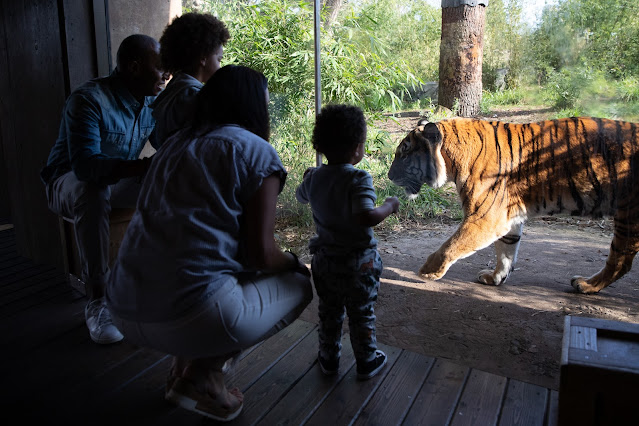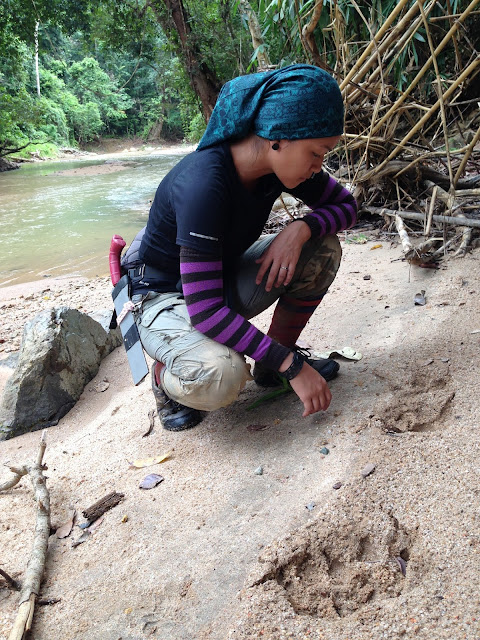Posted by Kirsten Pisto, Communications
Celebrate the powerful roar of the tiger as we usher in the 2022 Lunar New Year, Year of the Tiger.
 |
| It's year of the Bumi! |
Just six subspecies of tigers survive today: Malayan, Amur (or Siberian), Indian (or Bengal), South China, Indo-Chinese and Sumatran. All are endangered or critically endangered. The Malayan tiger lives only on the Malay Peninsula and the southern tip of Thailand. The population for Malayan tigers is dangerously low, with fewer than 250 living in their home range. They face tremendous pressure from poaching for the illegal wildlife trade and other threats including habitat loss due to residential and commercial development, logging and other human developments.
You can also download Cheyenne Mountain Zoo's Sustainable Palm Oil Shopping Guide mobile app to easily scan barcodes while you shop and expand your wildlife-friendly habits to your lunchbox, your kitchen pantry, your bathroom cabinets and beyond. Get the app here!
ADOPT A TIGER
MALAYAN TIGER ADOPTION SPECIAL $69
Available through April 30, 2022
Celebrate the Lunar New Year with an auspicious year of the tiger adoption special. Adopt now and help fund the daily care and feeding of our Malayan tigers Bumi and Azul as well as all of the zoo’s inhabitants.
Adoption package includes:
"The path to finding one’s passion can often be a windy one, and Wai Yee Lam is living proof. The former flight attendant initially trained in the psychology field, but now she’s part of a team of conservation heroes working on the frontlines to save wildlife". Get the details on this tiger hero and how her team is saving precious tiger habitat. Read more.
Watch Malaysia's Last Tigers, a documentary decades in the making that highlights this endangered species and what can be done to help them survive. February 5 and 6 on National Geographic channel: www.natgeotv.com/asia/malaysias-last-tigers/about
We are hopeful that critically endangered Malayan tigers can not only survive, but thrive. Our wish this Lunar New Year is that people across the globe find renewed energy and strength to help these precious big cats. While you rock your tiger socks or sip tiger-themed cocktails, here are some more ways to celebrate Year of the Tiger that will help protect the species. During Lunar New Year and all year long, we wish you a healthy and lucky year—here's to Bumi and Azul and the conservation actions you can take to show your stripes.
JOIN US, FEBRUARY 1, FOR SPECIAL YEAR OF THE TIGER PROGRAMS
Discover how your family can help save tigers through actions at home.
Join Woodland Park Zoo in celebrating tigers with talks and programs centered around its resident Malayan tigers, Azul and Bumi. Tuesday, February 1, 10:00 a.m.–4:00 p.m. Swing by a discovery station and enjoy hands-on activities, bio-facts, and fun stories and games highlighting tigers and their habitats.
- 10:00–11:00 Tiger Discovery Station
- 10:30–1:30 Yummy Box food truck in West Plaza
- 10:30–noon Rain or Shine Play Time
- 11:00 Tiger Talk and Enrichment
- noon–2:00 Tiger Discovery Station
- 2:00 Tiger Talk
- 3:00–4:00 Tiger Discovery Station
SUPPORT THE MALAYAN TIGER CONSERVATION PROGRAM
Every visit to the zoo helps support this conservation program to protect critically endangered Malayan tigers.
To help save these iconic big cats from extinction, in 2012 Woodland Park Zoo designed and created the Malayan Tiger Conservation Program in partnership with Panthera and a local organization, Rimba. This program works with the Terengganu State Government to protect tigers in and around Taman Negara National Park in peninsular Malaysia. Now entering a second 10-year agreement, with new on-ground partners Panthera-Malaysia and Nature-Based Solutions, the program has been enormously successful at protecting tigers and tiger habitat in the largest tiger landscape in the country.
The program has two main initiatives:
Many sweet treats include palm oil, the bulk of which is grown in Indonesia and Malaysia. To produce palm oil (the most widely used vegetable oil on the planet), tropical rain forest and peat swamps are being converted to agricultural land, confining the animals that live in these areas to much smaller habitat patches and making them susceptible to poaching and hunting, not to mention competition with other animals for limited resources. The good news? Many companies are committed to using sustainable palm oil and that means you can support this practice as a consumer.
For Lunar New Year, Valentine’s Day and other sweet occasions, use our wildlife friendly shopping guide that will delight your loved ones and save forests and wildlife a world away. The guide features companies that are sweet to animals and committed to sourcing certified sustainable palm oil that is deforestation free.
The program has two main initiatives:
- Stopping poaching with rangers trained to patrol the park and nearby wild forest lands, pulling snares and searching for poachers.
- Protecting habitat. Forests in Malaysia are disappearing rapidly, with the biggest culprit being the development of oil palm plantations. The program has worked with the government to create the first-ever state park in Terengganu, Kenyir State Park, which is 300 km2 of (now protected) pristine rain forest.
BECOME A PALM OIL PRO
Be sweet to animals while you shop.
Many sweet treats include palm oil, the bulk of which is grown in Indonesia and Malaysia. To produce palm oil (the most widely used vegetable oil on the planet), tropical rain forest and peat swamps are being converted to agricultural land, confining the animals that live in these areas to much smaller habitat patches and making them susceptible to poaching and hunting, not to mention competition with other animals for limited resources. The good news? Many companies are committed to using sustainable palm oil and that means you can support this practice as a consumer.
For Lunar New Year, Valentine’s Day and other sweet occasions, use our wildlife friendly shopping guide that will delight your loved ones and save forests and wildlife a world away. The guide features companies that are sweet to animals and committed to sourcing certified sustainable palm oil that is deforestation free.
Watch: Palm Oil Solutions: https://youtu.be/dOWhf52YIbA
ADOPT A TIGER
Symbolically snuggle a tiger and support your zoo by becoming a ZooParent.
MALAYAN TIGER ADOPTION SPECIAL $69
Available through April 30, 2022
Celebrate the Lunar New Year with an auspicious year of the tiger adoption special. Adopt now and help fund the daily care and feeding of our Malayan tigers Bumi and Azul as well as all of the zoo’s inhabitants.
Adoption package includes:
- One tiger plush
- Personalized adoption certificate
- Species fact sheet
- Animal photos
- ZooParent window decal
- Online recognition for one year
WE ARE ALL TIGER KEEPERS
Get heart to heart with animal keeper Carolyn Sellar and her passion for tiger conservation.
Animal keeper Carolyn Sellar works with Malayan tigers and orangutans at Woodland Park Zoo, and is a passionate advocate for endangered species. In 2019, she traveled to Malaysia to visit with MYCAT, one of the zoo’s Wildlife Survival Programs to see what's at stake for tigers and what YOU can do to help advocate for these incredible cats and their forest habitat. Read more here about her experience and get inspired.
Watch: We Are All Tiger Keepers: https://youtu.be/HJUzZbK0Opc
GET INSPIRED!
Wai Lee Yam protects tiger habitat and has carved out a profession in keeping precious tiger forests around for future generations of wildlife.
VISIT + LOVE BUMI AND AZUL
Get to know the tigers who live at Woodland Park Zoo, and share your love for them far and wide.
Woodland Park Zoo currently has two Malayan tigers: Azul, a 6-year-old female who arrived last year, and Bumi, an 11-year-old male. Speaking of Year of the Tiger, Bumi was born in 2010, which is among the Years of the Tiger! Because tigers are solitary animals (except for mating and mom and cubs), visitors can see Azul and Bumi on a rotational schedule in Banyan Wilds.
Bumi and Azul have a breeding recommendation from the Association of Zoos & Aquariums’ Malayan Tiger Species Survival Plan. The zoo plans to introduce Bumi and Azul sometime this year with the hope of pouncing tiger kitty paws in the near future.
The Malayan Tiger Species Survival Plan is a cooperative, conservation breeding program across accredited zoos to help ensure a healthy, self-sustaining population of tigers. Led by experts in husbandry, nutrition, veterinary care, behavior, and genetics, Species Survival Plans also involve a variety of other collaborative conservation activities such as research, public education, reintroduction and field projects.
The Malayan Tiger Species Survival Plan is a cooperative, conservation breeding program across accredited zoos to help ensure a healthy, self-sustaining population of tigers. Led by experts in husbandry, nutrition, veterinary care, behavior, and genetics, Species Survival Plans also involve a variety of other collaborative conservation activities such as research, public education, reintroduction and field projects.
When you visit the zoo, you support tiger conservation. When you share your love for this endangered species, and ways you and your friends and family can help tigers, you are making a big difference for these big cats. Share your love for tigers around the campfire, at the coffee shop or on social... you never know who you might inspire!
MORE ROAR?
Check out our Insta story all about tigers
Show your stripes with the Vanishing Species Stamp which helps fund wildlife conservation.
Listen to this podcast about the future for Malayan tigers, or explore this Q and A about tigers or watch this spotlight on our very own Bumi or read this blog about trekking through tiger habitat!
Just for kids! Write a love letter to a tiger or color by numbers and check out this palm oil activity packet.
Save this wallpaper (below) to your favorite mobile device to remind you that you can be a fierce and strong advocate for tiger conservation! P.S. More tiger-inspired wallpapers on our Instagram "Year of the Tiger" story, check it out!











Comments
Post a Comment